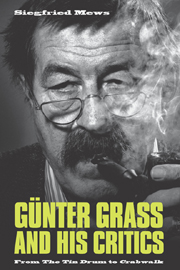Book contents
- Frontmatter
- Contents
- List of Abbreviations
- Introduction
- Part 1 Danzig, Center of the Universe
- 1 Die Blechtrommel / The Tin Drum
- 2 Katz und Maus / Cat and Mouse
- 3 Hundejahre / Dog Years
- 4 Danziger Trilogie / The Danzig Trilogy
- Part 2 From Danzig to the Global Stage: Grass's Fiction of the 1970s and 1980s
- Part 3 After Reunification: Old Problems and New Beginnings
- Epilogue
- Works Cited
- Index
1 - Die Blechtrommel / The Tin Drum
from Part 1 - Danzig, Center of the Universe
Published online by Cambridge University Press: 05 February 2013
- Frontmatter
- Contents
- List of Abbreviations
- Introduction
- Part 1 Danzig, Center of the Universe
- 1 Die Blechtrommel / The Tin Drum
- 2 Katz und Maus / Cat and Mouse
- 3 Hundejahre / Dog Years
- 4 Danziger Trilogie / The Danzig Trilogy
- Part 2 From Danzig to the Global Stage: Grass's Fiction of the 1970s and 1980s
- Part 3 After Reunification: Old Problems and New Beginnings
- Epilogue
- Works Cited
- Index
Summary
From Die Blechtrommel to The Tin Drum
ATTRAKTION UND ÄRGERNIS (ATTRACTIVENESS AND NUISANCE), the subtitle of Franz Josef Görtz's 1984 anthology of reviews of Die Blechtrommel, which appeared on occasion of the twenty-fifth anniversary of its publication, aptly summarizes the wide divergence and contradictory nature of critical opinion that Grass's first novel elicited. Although Die Blechtrommel is today acknowledged as the major work of postwar German literature, its present-day canonical status tends to obscure the decidedly mixed reactions it initially received. True, Gruppe 47, that most influential gathering of postwar West German literati, awarded Grass their prepublication prize for reading two chapters from the manuscript of the novel at their 1958 meeting, and the same year critics such as Joachim Kaiser, Marcel Reich-Ranicki, and Hans Schwab-Felisch took notice of an emerging, forceful talent. Upon publication of the novel, reviewers eagerly welcomed a fresh voice that signaled the beginning of a new phase of literary development almost fifteen years after the end of a disastrous war. For example, one commentator, who is identified merely by initials, avers that the epic construct of Die Blechtrommel can be compared only to Thomas Mann's Buddenbrooks, a novel published in 1901 (hlg 1959). Conversely, among the more than 160 reviews, not all of which are included in Görtz's anthology, there are several that express an unrelentingly negative view. For instance, one physician-turned-critic engages in a pun to voice his disdain — he changes the Blechtrommel (tin drum) of the title to Brechtrommel (a drum that causes one to vomit) — and warns his readers against the supposedly inferior work because of its voyeuristic, obscene, and blasphemous ingredients (Müller-Eckhard 1959).
- Type
- Chapter
- Information
- Günter Grass and his CriticsFrom 'The Tin Drum' to 'Crabwalk', pp. 15 - 59Publisher: Boydell & BrewerPrint publication year: 2008



